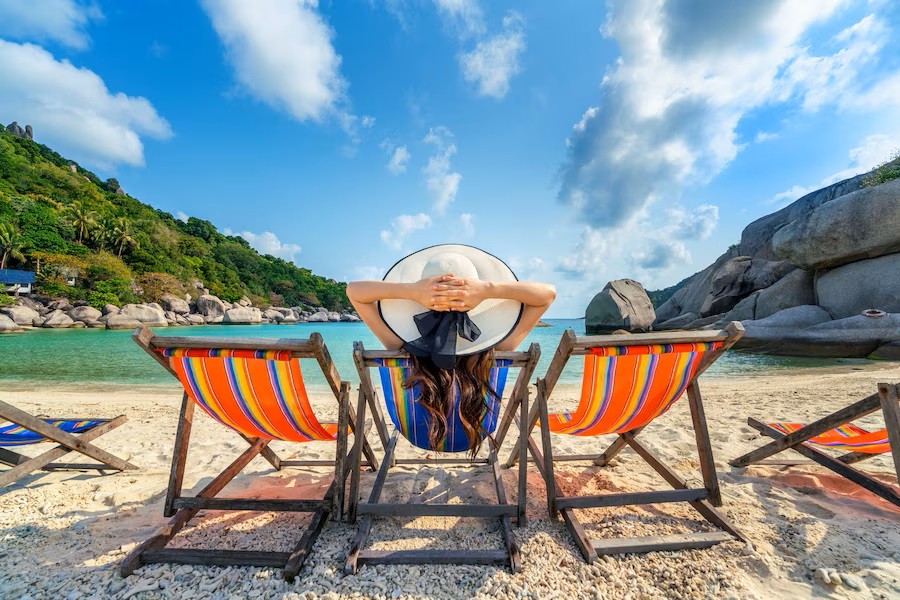In the hustle and bustle of modern life—filled with work pressures, financial challenges, responsibilities, and daily routines—vacations are often seen as a luxury. However, research suggests that vacations offer more than just an opportunity to unwind. They play a vital role in supporting mental health and well-being.
Taking a break from everyday life can offer a wide range of benefits, from reducing stress to boosting happiness and productivity. In this article, we’ll explore how vacations can positively impact your mental health.
Benefits of Vacation for Mental Health
The daily demands of life can take a toll on both the body and the mind, often leading to increased stress levels. Chronic stress, if left unmanaged, can contribute to mental health issues such as anxiety, depression, and burnout.
Vacations provide a much-needed opportunity to step away from daily routines, allowing the mind to rest and recharge. According to the American Psychological Association (APA), taking regular breaks through vacations can play a significant role in alleviating stress, improving psychological well-being, and even aiding in the recovery from mental health challenges.
Here are some of the key benefits of taking a vacation for your mental health:
Reduce stress
One of the primary benefits of a vacation is its ability to help reduce stress. When you take time off, your body’s cortisol levels—the hormone linked to stress—decrease.
Engaging in relaxing activities such as strolling through nature, lounging on the beach, or exploring new destinations provides an opportunity for both body and mind to relax. This helps you feel emotionally revitalized, allowing you to return to your routine with a renewed sense of energy and calm.
Improve Happiness
Vacations offer a chance to spend quality time with yourself and with loved ones. Whether it's visiting new attractions, trying new foods, or simply relaxing, these enjoyable experiences can stimulate the release of dopamine, a neurotransmitter associated with feelings of pleasure and happiness.
Improve focus and creativity
A monotonous daily routine can cause mental fatigue, reducing your ability to think clearly and come up with creative ideas. Going on vacation allows your brain to break free from the same repetitive patterns, leading to fresh perspectives.
Exploring new places or engaging in novel activities can spark creativity. After a vacation, many people find they return to work feeling more focused and better equipped to tackle tasks with innovation.
Strengthen social relations
Vacations are an ideal opportunity to strengthen relationships with family, friends, or romantic partners. Sharing new experiences together can create lasting memories and improve the quality of interpersonal connections.
Improving Physical Health, Which Supports Mental Health
Mental and physical health are closely linked, and vacations that involve physical activity, such as hiking, swimming, or walking can have a positive impact on both. Exercise releases endorphins, which are hormones known for their mood-lifting effects.
To maximize the mental health benefits of a vacation, it's important to plan your time off effectively. Stay physically active during your break, and try to disconnect from work and digital distractions as much as possible.
If you begin experiencing symptoms of mental health concerns such as persistent anxiety or depression, it is important to seek professional help. For additional support, you can use the Ai Care app to connect with healthcare professionals for advice and guidance. The app is available for download on both the App Store and Play Store.
Looking for more information about other diseases? Click here!
- dr Nadia Opmalina
WebMD (2024). How Travel Affects Mental Health. Available from: https://www.webmd.com/mental-health/how-travel-affects-mental-health
CDC (2022). Mental Health and Travel. Available from: https://wwwnc.cdc.gov/travel/page/mental-health
Robby Berman (2023). People who travel report better health, study finds. Available from: https://www.medicalnewstoday.com/articles/people-who-travel-report-better-health-study-finds
Stacey Lastoe and Hilary I. Lebow (2022). 5 Ways Travel Is Good for Your Mental Health. Available from: https://www.everydayhealth.com/emotional-health/ways-travel-is-good-for-your-mental-health/
Better Health Channel. v. Available from: https://www.betterhealth.vic.gov.au/health/healthyliving/work-related-stress
Jessica de Bloom, PhD and Sarah Pressman, Phd (2024). Speaking of Psychology: Why you should take a vacation. Available from: https://www.apa.org/news/podcasts/speaking-of-psychology/vacation












